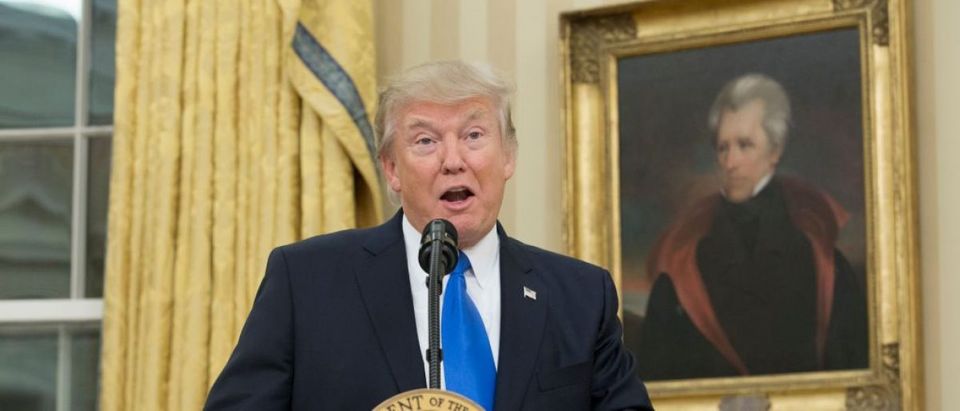A misreading of President Donald Trump’s comments on Andrew Jackson and the Civil War caused fact checkers and public figures to go wild Monday with speculations on the president’s understanding of history.
Many of the immediate reactions to his statement and a lot of the ensuing fact checks repeated that Trump was ignorant of when Jackson died. The president even clarified that he knows Jackson died before the Civil War started in 1861.
It’s fairly clear from the full transcript that Trump understood that Jackson was not around at the start of the Civil War.
“I mean, had Andrew Jackson been a little later, you wouldn’t have had the Civil War,” Trump said at the beginning of the offending paragraph, but that did not stop many news outlets from questioning Trump’s chronology.
Here’s a portion of the conversation between Trump and Washington Examiner reporter Salena Zito from SiriusXM’s P.O.T.U.S. channel, with emphasis added:
TRUMP: [Jackson] was a swashbuckler. But when his wife died, did you know he visited her grave every day? I visited her grave actually because I was in Tennessee.
ZITO: Oh, that’s right. You were in Tennessee.
TRUMP: And it was amazing. The people of Tennessee are amazing people. They love Andrew Jackson. They love Andrew Jackson in Tennessee.
ZITO: Yeah, he’s a fascinating…
TRUMP: I mean, had Andrew Jackson been a little later, you wouldn’t have had the Civil War. He was a very tough person, but he had a big heart. And he was really angry that — he saw what was happening with regard to the Civil War. He said, ‘There’s no reason for this.’ People don’t realize, you know, the Civil War — if you think about it, why? People don’t ask that question, but why was there the Civil War? Why could that one not have been worked out?
Journalists, politicians and other public figures immediately excoriated the president for lacking basic historical knowledge, noting that Jackson died in 1845, 16 years before the Civil War. “Note to President Trump: Andrew Jackson wasn’t alive during the Civil War,” USA Today wrote in its headline.
Trump claimed Andrew Jackson was “really angry” about the Civil War – despite him having died 16 years prior to it https://t.co/PjzdY3nIiY pic.twitter.com/Cd3IJjY1P7
— POLITICO (@politico) May 2, 2017
Jackson died in 1845. The civil war began in 1861. https://t.co/KUGqaESWrl
— Jake Tapper (@jaketapper) May 1, 2017
1 word answer: Slavery. Longer: When Andrew Jackson died in 1845 (16 yrs before the Civil War began), he owned 150 men, women and children. https://t.co/Icg6puG2JZ
— Chelsea Clinton (@ChelseaClinton) May 1, 2017
Andrew Jackson died in 1845.
Trump said Jackson was “really angry” about the Civil War.
The Civil War started in 1861.
— Steven Dennis (@StevenTDennis) May 1, 2017
Trump’s later statement that Jackson “saw what was happening with regard to the Civil War” may have caused the confusion. Many fact checks continued to point out that Trump was wrong about Jackson living through the Civil War.
“One glaring issue here: Jackson wasn’t really angry about what was happening with the Civil War, because he died more than a decade (1845) before it started (1861),” the Washington Post’s fact check said.
“There’s one major problem with that statement: Jackson died in 1845, nearly 16 years before the Civil War began,” USA Today wrote.
According to Jon Meacham, author “American Lion,” a biography of Jackson, the claim that Jackson saw a secession conflict coming has a factual basis. Jackson even prevented a secession movement during his presidency.
Trump was likely referring to what’s known as the nullification crisis of 1832, three years into Jackson’s first term as president. Jackson threatened to send federal troops into South Carolina when the state threatened secession over federal tariffs on trade. Jackson “took a firm stand on the side of the union,” Meacham told the New York Times.
The causes for the secessionist movement during nullification crisis were different from the conflict that eventually led to the Civil War. The root of the 1832 secession threat was tariffs, not slavery.
Trump’s main point, as he clarified late Monday in a tweet, was that Andrew Jackson predicted a conflict between the states, and “would never have let it happen.”
President Andrew Jackson, who died 16 years before the Civil War started, saw it coming and was angry. Would never have let it happen!
— Donald J. Trump (@realDonaldTrump) May 2, 2017
While its difficult to argue historical ‘what ifs,’ Trump has a point that Jackson would likely have worked to prevent the conflict over whether the new states coming into the Union would be slaveholding or free states.
Many people also questioned Trump’s grasp of history when he appeared to refer to the 19th century abolitionist Frederick Douglass in the present tense.
“Douglass is an example of somebody who’s done an amazing job that is being recognized more and more, I notice,” Trump said during a February speech honoring the start of Black History Month.
The statement may say more about Trump’s loose grammar than his grasp of history. If Trump were referring to a growing recognition of Douglass’ contributions to Black history, “Then the president’s remarks were on the money,” the Washington Post wrote.
Follow Thomas Phippen on Twitter
Send tips to thomas@dailycallernewsfoundation.org.
All content created by the Daily Caller News Foundation, an independent and nonpartisan newswire service, is available without charge to any legitimate news publisher that can provide a large audience. All republished articles must include our logo, our reporter’s byline and their DCNF affiliation. For any questions about our guidelines or partnering with us, please contact licensing@dailycallernewsfoundation.org.


